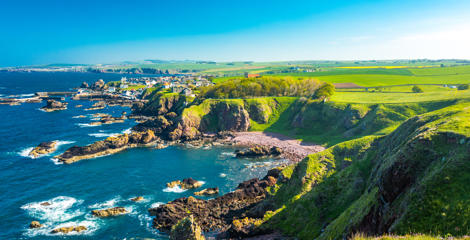Advancing marine research: The Scottish Vessel Project’s impact on sustainable fishing
From Scotland to the Arctic
The conservation of marine mammals is a global concern, particularly in regions experiencing rapid environmental changes and increased human activities. At Heriot-Watt University, we have multiple projects which seek to actively involve the public in understanding and protecting marine ecosystems. By working together, researchers, government agencies, and local communities will enhance understanding of our oceans, the marine mammals we seek to protect and safety at sea.
Whales & Arctic VEssels (WAVE) Project
The WAVE project aims to establish a coordinated monitoring system for cetacean populations in the Arctic. By collaborating with expedition operators, the project collects data on whale encounters, including species identification, behavior, and population trends. This information is crucial for informing conservation measures and managing human activities such as shipping, fishing, and tourism, which pose risks to whales through collisions, entanglement, and noise pollution.
You can get involved in a number of ways:
- Public Participation: The project involves the public by providing educational opportunities on expedition vessels. Guests can participate in data collection and attend lectures and demonstrations, fostering a deeper understanding of Arctic cetaceans and the challenges they face.
- Collaborative Efforts: The WAVE project brings together scientists, policymakers, industry stakeholders, conservationists, and educators to generate new knowledge and promote sustainable practices.
Mapping Arctic Marine Mammals Project
This project focuses on understanding the distribution and behaviour of marine mammals in the Arctic, particularly in the context of increasing human activities. By conducting on-ship surveys and utilizing satellite imagery, the project aims to document whale-vessel interactions and evaluate their impacts. The data collected will help improve our understanding of spatial conflicts and guide conservation efforts. We engage with wider communities in two key ways:
- Community Involvement: We are collaborating with Arctic expedition operators to conduct surveys, providing a platform for community involvement in scientific research.
- Educational Outreach: By sharing findings with the public and stakeholders, the project raises awareness about the importance of protecting Arctic marine mammals and the need for sustainable practices.
Scottish Vessel Project
The Scottish Vessel Project was a collaborative initiative that aims to capture comprehensive marine vessel data along Scotland's coastline to better understand the exposure of whales, dolphins, and seals to boats. The team deploys vessel monitoring equipment to collect data on large and small boats, which is analysed alongside shore-based sightings data of boats and marine life. This helps investigate the spatial overlap between vessel activities and marine mammal habitats.
Throughout the project, the public were encouraged to report sightings of interesting vessels and marine life, contributing valuable data to the research. We also ran community workshops to educate and involve local communities, allowing them to contribute their knowledge and learn about responsible vessel practices.
Join us in preserving Scotland's maritime heritage and ensuring a vibrant future for our coastal communities. To find out more, contact engage@hw.ac.uk.
Related content

The Lyell Centre
A world-class institute at the forefront of geosciences and marine research, addressing global challenges in climate change, energy, and environmental sustainability.
Sustaining our earth and oceans
Explore how Heriot-Watt research is protecting our planet by tackling climate change, conserving ecosystems and advancing sustainable use of earth and ocean resources.
